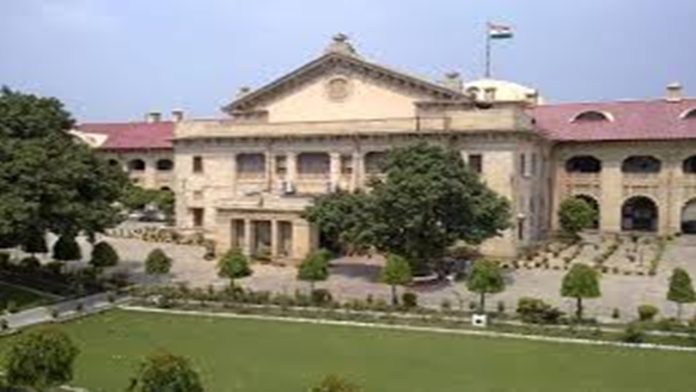The Allahabad High Court while dismissing an appeal held that for taking advantage of acknowledgement for the purpose of extension of limitation, it is sine qua non that the acknowledgement must take place within the period of limitation.
The Division Bench of Chief Justice Arun Bhansali and Justice Vikas Budhwar passed this order while hearing an appeal filed by M/S Standard Niwar Mills.
The appeal is directed against the order dated 01.02.2024 passed by the Commercial Court, Kanpur Nagar, whereby the petition filed by the appellant under Section 34 of the Arbitration and Conciliation Act, 1996 against the award dated 16.07.2015, signed on 09.09.2015, passed by the Micro, Small and Medium Enterprises Facilitation Council, has been dismissed.
The appellant had approached the Council by raising claim on 14.05.2012, claiming a sum of Rs 40,17,889/- as principal and Rs 3,25,59,035/- as interest under the Micro, Small and Medium Enterprises Development Act, 2006.
Before the Council, objections were raised pertaining to the claim being barred by limitation, wherein the respondent indicated that the petition has been filed after about 14 years from 2001 and the delay in filing the claim cannot be condoned and the same deserves to be dismissed.
The Council, by its award dated 16.07.2015 on the issue whether the Reference was barred by the provisions of Limitation Act, 1963, came to the conclusion that admittedly the matter related to payment during the period of year 1998 to the year 2001 and the Reference has been made on 26.12.2012 and apparently, the same was barred by limitation and consequently, dismissed the Reference.
Feeling aggrieved, application under Section 34 of the Act was filed before the Commercial Court. Before the Commercial Court, the respondent raised objections pertaining to maintainability of the Reference before the Council and reiterated the objections that the claim was barred by limitation. A rejoinder was filed, inter alia, indicating that the Council had the jurisdiction to deal with the matter and that as the respondent had acknowledged the liability of payment of claim from 05.09.2010 onwards upto 17.01.2014 in writing, the claim was within limitation.
The Commercial Court, by its impugned order, raised three issues for determination pertaining to the jurisdiction of the Council to hear the matter, whether the claim was barred by limitation and whether the award was liable to be set aside.
On the issue of jurisdiction, the Commercial Court came to the conclusion that the agreement was entered into in the year 1998 and the appellant got registered as MSME on 18.12.2010 and at the time when the supply under the contract was over, it was not registered under the Act of 2006 and as such, it could not have taken the benefit of the Act of 2006. On the issue of limitation, it was found that the supply was made in the year 1998, 1999 and the last supply was made on 14.01.2000 and the claim was filed with the Council in the year 2012, based on which it was found that the claim was barred by limitation and consequently, dismissed the application filed under Section 34 of the Act.
Counsel for the appellant made submissions that the Commercial Court was not justified in holding that the Council had no jurisdiction to deal with the issues on account of the fact that the supply was made prior to the registration of appellant under the Act of 2006. Further submissions were made that specific plea pertaining to acknowledgement was raised before the court on the aspect of limitation. However, the same has not at all been considered, resulting in rendering an incorrect finding and, therefore, the order impugned deserves to be quashed and set aside.
Counsel appearing for the respondent contested the submissions made. It was emphasized that the registration under the Act of 2006 was necessary prior to the supply of the goods and once the supply had been prior to the registration, the proceedings before the Council were not maintainable.
The Court observed that,
A perusal of the award made by the Council would reveal that the aspect pertaining to the jurisdiction of the Council was not raised before the Council and the Council had framed issue pertaining to limitation and came to the conclusion that the same was barred by limitation. A perusal of the material placed on record, including the application, which has been made before the Council, reveals that the bills pertaining to supply of tents started from 13.05.1998 and the last bill is dated 14.01.2000. Neither in the form nor in the application made before the Council, any averment pertaining to the claim being within limitation was made. The respondent, in its objections, raised specific plea pertaining to the claim being barred by limitation, to which apparently no rejoinder was filed.
A perusal of the above response would reveal that the appellant relied on the aspect that the acknowledgement was made from 05.09.2010 onwards upto 17.01.2014 in writing. Admittedly, once the last supply was made on 14.01.2000, the cause of action to the appellant arose on that date, even if the supplies made from 13.05.1998 to 14.01.2000 are taken by way of that running/ current account.
The plea raised pertaining to the acknowledgement admittedly is of the year 2010 onwards i.e. 05.09.2010 upto 17.01.2014.
“Admittedly, the limitation in the case, based on the last bill dated 14.01.2000, would expire in the year 2003 and the acknowledgement, as claimed, is dated 05.09.2010 i.e after the expiration of the limitation and, therefore, the appellant could not take benefit of the said purported acknowledgements and consequently, the finding recorded by the Council as well as the Commercial Court regarding the claim being barred by limitation, cannot be faulted”, the Court further observed while dismissing the appeal.


